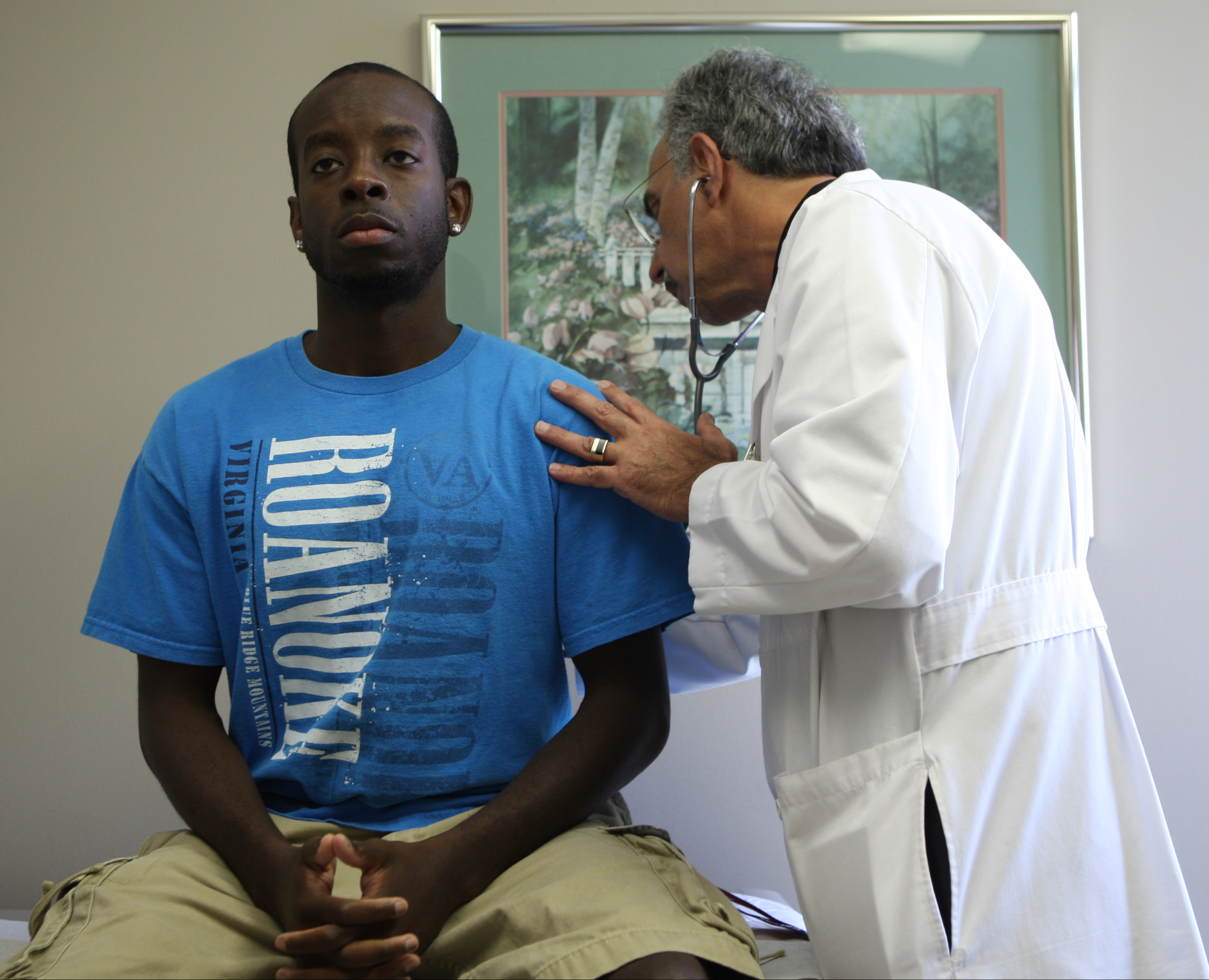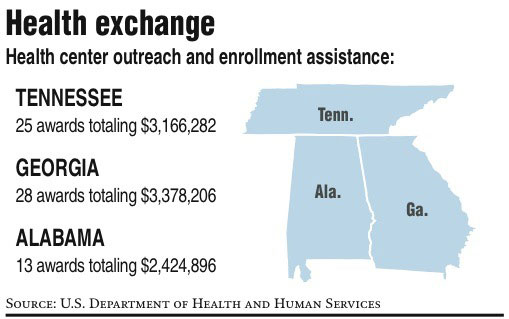 Dr. Farrokh Ghamgosar, right, listens with a stethoscope to patient Michael Logan at Dodson Avenue Community Health Center on Monday. Logan, who does not currently have health insurance, is hoping to gain coverage through employment. Logan said that if the employment falls through, he would be interested in applying for insurance through Obamacare.
Dr. Farrokh Ghamgosar, right, listens with a stethoscope to patient Michael Logan at Dodson Avenue Community Health Center on Monday. Logan, who does not currently have health insurance, is hoping to gain coverage through employment. Logan said that if the employment falls through, he would be interested in applying for insurance through Obamacare.WHAT IS THE HEALTH INSURANCE MARKETPLACE?• The Health Insurance Marketplace, also known as health exchanges, is the federally-overseen online marketplace that will allow the uninsured to comparison shop for and purchase coverage at what the government has said will be more affordable rates.• The marketplace will also give people access to subsidies that will help people with annual incomes up to 400 percent of the federal poverty level - $45,960 for an individual and $94,200 for a family of four.• Health insurance companies can offer plans through the exchange, though the federal government will select which companies it determines have Qualified Health Plans.• States can opt to run their own exchanges or, by default, have the federal government facilitate them them. Tennessee, Georgia and Alabama have all opted for federally-maintained exchanges.• To learn more about the Marketplace, visit www.HealthCare.gov/MarketplaceSources: U.S. Department of Health and Human Services; Kaiser Family Foundation; Blue Cross Blue Shield of TennesseeOUTREACH AND ENROLLMENT FUNDINGNearly all of the nation's federally funded community health centers - including several in the area - will be getting a chunk of $150 million in federal health law money to help enroll uninsured patients in new online health insurance marketplaces.Southeast Tennessee• Chattanooga-Hamilton County Hospital Authority* - $143,260• Hamilton County Health Dept. - $99,480• Cherokee Health Systems - $240,324Northwest Georgia• Primary Health Care Center of Dade Inc.' Trenton - $128,267Northeast Alabama• Northeast Alabama Health Services Inc., Scottsboro - $108,258* Includes 3 community health centers run by Erlanger Health System A statewide company that includes one clinic in ChattanoogaSource: U.S. Department of Health and Human Services
If you're confused about the federally-run online insurance marketplace that kicks into gear this October through the new health care law, you're far from alone.
Nationwide, 79 percent of Americans and 87 percent of uninsured people said they know little or nothing about the health exchanges, the Kaiser Family Foundation reported this month.
That's one reason why the federal government has agreed to funnel millions of dollars in grant money to community health centers this month.
The money is meant to get boots-on-the-ground assistance for consumers, allowing local federally-funded health centers to spearhead outreach programs.
It can also go toward hiring and training counselors to guide consumers through the web of new insurance options under the Affordable Care Act.
"We really have to mount a community education initiative so people understand it," said Joe Winick, senior vice president of planning at Erlanger Health System, and director of the three community health centers that operate under the hospital's umbrella.
"Anticipating this influx of people ... the health centers were seen as a primary access point for the newly insured."
Community health centers have long been primary care hubs for people from all insurance backgrounds -- including the uninsured. They operate on sliding-scale fees and offer a variety of specialties in one place.
But starting this fall, they will be on the front lines of turning the complex law into concrete steps for patients.
Between Erlanger's centers and the Hamilton County Health Department, Hamilton County will get more than $240,000 to put toward connecting the county's 50,000 uninsured residents with appropriate coverage.
Cherokee Health Systems, which recently started a community health center in Chattanooga, also received a sizable chunk of funding for its clinics.
"Having trained, face-to-face assistance in enrollment from trusted resources at local health centers means more people will get the help they need," said Mary Wakefield, administrator of the U.S. Health Resources and Services Administration, in a news relese.
The Affordable Care Act requires every person to have health insurance, or pay a fine. The exchanges are meant to be an online, one-stop shop for people to compare shop and buy insurance for themselves or their families.
Open enrollment for the exchanges begins Oct. 1. Benefits go into effect Jan. 1, 2014.
Winick learned last week that the centers got the grant, and he has had to hit the ground running.
In the two-and-a-half months until the looming autumn deadlines, leaders like Winick are racing to nail down specifics. The government is still outlining eligibility requirements. Counselors need to be trained and certified before they can help people enroll. Locations for assistance need to be set up.
He hopes to form a steering committee made up of "key stakeholders" -- community leaders, officials from all three hospitals in town, and private practices -- and figure out how to maximize the number of people who can help with the enrollment process.
To truly boost enrollment, there will need to be "access points" throughout the city: hospital ERs, doctor's offices, and community centers, where staff members can help patients explore their insurance options or enroll on the spot.
Winick plans to hire contractors to help with the massive effort, but volunteers will be needed, too, he said -- comparing the work to voter registration.
Once the counselors are in place, anyone will be able to go to them for help free of charge.
"The goal is to change the dyanamics of health care. We need to make sure people start using a primary care physician instead of going to the emergency room," he said."In my view, an informed and educated community will make a difference in health care," Winick said.
While Winick hopes high enrollment on the exchanges will make a dent in the number of uninsured patients, there will still be thousands of patients who will not be eligible to receive coverage under the Affordable Care Act unless Tennessee leaders decide to expand TennCare benefits to more people.
Contact staff writer Kate Harrison at kharrison@timesfreepress.com or 423-757-6673.

